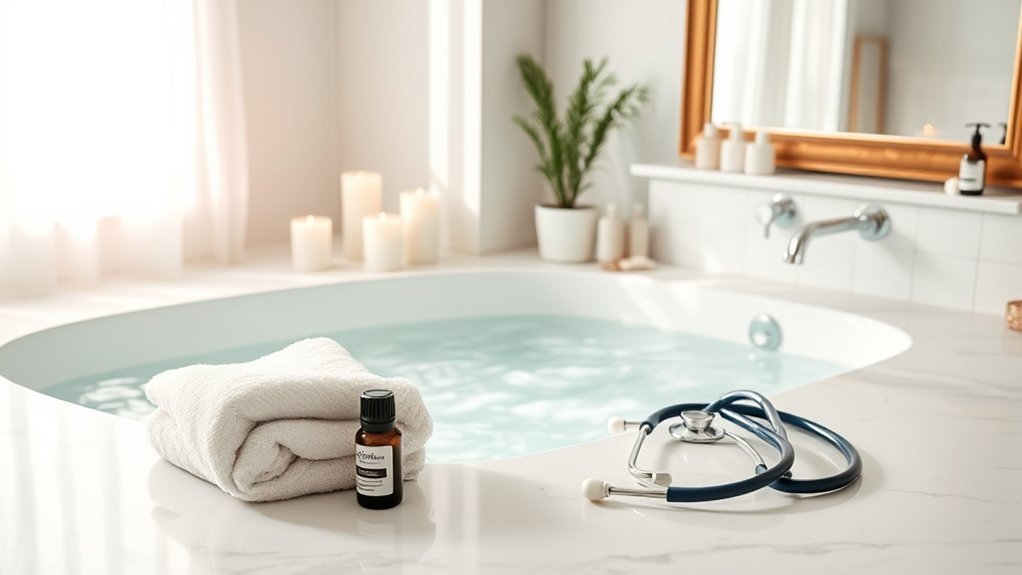You might think that bathing daily is the golden rule for healthy skin, but that’s not always the case. Different age groups and skin types have unique needs that can change how often you should bathe. If you’ve noticed persistent redness or itching, you might need to reassess your routine. Understanding when to seek medical advice can make all the difference in maintaining your skin’s health and comfort. What signs should you watch for?
Understanding Bathing Frequency for Different Age Groups
When considering bathing frequency, it’s important to recognize that different age groups have varying needs.
Infants typically require less frequent baths, as their skin is sensitive and can dry out quickly. Bathing them two to three times a week is often sufficient.
For toddlers and young children, you might aim for a bath every other day, depending on their activity level and playtime.
As children grow into preteens and teenagers, daily bathing becomes more common due to increased sweat and oil production.
Adults usually benefit from daily baths or showers, particularly if they engage in physical activities.
For seniors, bathing frequency can vary based on mobility and skin health, with some preferring to bathe every few days, while others may choose daily cleansing.
Signs That Indicate a Need for More Frequent Bathing
If you notice an increase in body odor, skin irritation, or excessive oiliness, these are clear signs that you might need to adjust your bathing frequency. Paying attention to these cues can help maintain your skin health and overall hygiene. Here’s a quick reference table to identify these signs:
| Sign | Possible Causes | Suggested Action |
|---|---|---|
| Body Odor | Sweat, bacteria buildup | Bathe more frequently |
| Skin Irritation | Allergens, sweat, dirt | Consult a dermatologist |
| Excessive Oiliness | Hormonal changes, diet | Increase bathing frequency |
| Acne Breakouts | Clogged pores | Implement regular cleansing |
| Dry or Flaky Skin | Weather, dehydration | Moisturize and bathe often |
Adjusting your routine can help you feel fresher and more comfortable.
Skin Types and Their Bathing Needs
Understanding your skin type is key to determining how often you should bathe. If you have oily skin, daily bathing can help remove excess oil and prevent breakouts.
For normal skin, bathing every other day is often sufficient to maintain balance. If your skin is dry or sensitive, consider bathing less frequently, perhaps two to three times a week, to avoid stripping natural oils and causing irritation.
Combination skin may require a tailored approach, focusing on problem areas as needed. Additionally, factors like climate, activity level, and personal hygiene preferences can influence your bathing frequency.
When to Seek Medical Advice Regarding Skin Health
Recognizing the signs that indicate a need for medical advice regarding skin health is essential for maintaining your overall well-being.
If you notice persistent redness, swelling, or irritation, it’s important to consult a healthcare professional. Unexplained rashes or changes in moles, such as size, shape, or color, can be serious and warrant immediate attention.
Additionally, if you experience severe itching, flaking, or peeling skin that doesn’t improve with basic care, seek advice. Signs of infection, like increased warmth, pus, or fever, should also prompt a doctor’s visit.
Finally, if you feel your skin issues are affecting your mental health, don’t hesitate to reach out for help. Timely intervention can prevent complications and promote healthier skin.
Tips for Maintaining Healthy Skin Without Overbathing
Maintaining healthy skin doesn’t have to mean frequent bathing; in fact, overbathing can strip your skin of essential oils and lead to dryness.
Instead, focus on moisturizing regularly to keep your skin hydrated. Use a gentle, fragrance-free cleanser to avoid irritation, and limit bathing to a few times a week.
When you do bathe, opt for lukewarm water rather than hot, as hot water can exacerbate dryness. Incorporate a daily sunscreen to protect your skin from UV damage, and consider a humidifier in dry environments to maintain moisture levels.
Additionally, stay hydrated by drinking plenty of water and eat a balanced diet rich in vitamins and healthy fats to support skin health from within.
Frequently Asked Questions
Can Bathing Too Often Damage the Skin Barrier?
Yes, bathing too often can damage your skin barrier. Frequent washing strips natural oils, leading to dryness and irritation. It’s crucial to find a balance that maintains skin health without over-cleansing.
What Is the Best Time of Day for Bathing?
Bright and brisk mornings are the best time for bathing. They wake you up and refresh your skin. Alternatively, soothing evening baths can relax you before sleep. Choose what fits your routine and preference!
Are There Specific Products to Avoid During Bathing?
Yes, avoid products with harsh chemicals, strong fragrances, or alcohol. These can irritate your skin, disrupt its natural barrier, or cause allergic reactions. Opt for gentle, hypoallergenic options to keep your skin healthy and comfortable.
How Does Climate Affect Bathing Frequency Recommendations?
Just like a flower needs sunlight, your skin thrives on the right climate. In hot, humid weather, you’ll likely need to bathe more often to remove sweat and bacteria compared to cooler, drier conditions.
Should I Adjust Bathing Habits for Exercise Frequency?
Yes, you should adjust your bathing habits based on exercise frequency. If you’re exercising regularly, you’ll likely need to bathe more often to remove sweat and bacteria, promoting better skin health and hygiene.
Conclusion
In the quest for clean skin, you might think bathing more often is always better. Ironically, overbathing can strip your skin of essential oils, leading to irritation and dryness. Remember, knowing when to seek medical advice is just as important as your bathing routine. So, while it’s tempting to hop in the shower every chance you get, pay attention to your skin’s signals. After all, healthy skin often thrives on balance, not excess.
